
Smart Money-Saving Strategies for Financial Success
In a world where financial stability is paramount, adopting effective money-saving tips is key to achieving long-term financial success. This article delves into practical strategies individuals can implement to save money wisely and build a secure financial foundation.
Creating a Budget: The Foundation of Financial Planning
A well-structured budget is the cornerstone of effective money management. Start by outlining your income, fixed expenses, and discretionary spending. Categorize your expenses to identify areas where you can cut back and allocate more funds towards savings.
Automate Savings: Set It and Forget It
Take advantage of automation to simplify your savings plan. Set up automatic transfers from your checking account to a dedicated savings account. This ensures a consistent and hassle-free approach to building your savings without the temptation to spend.
Shop Smart: Embrace Discounts and Comparison Shopping
Make it a habit to hunt for discounts and compare prices before making purchases. Utilize cashback apps, look for promotional codes, and consider buying generic brands. These small actions can lead to significant savings over time.
Cut Unnecessary Expenses: Identify and Eliminate
Evaluate your monthly subscriptions, memberships, and other recurring expenses. Identify services you no longer use or need and cut them from your budget. Redirecting funds from unnecessary expenditures to savings accelerates your financial goals.
Emergency Fund: Financial Safety Net
Building an emergency fund is a crucial aspect of financial planning. Aim to save at least three to six months’ worth of living expenses. This fund provides a safety net during unexpected events, such as job loss or medical emergencies, preventing reliance on credit or loans.
Debt Repayment Strategy: Tackle High-Interest Debts First
Prioritize paying off high-interest debts, such as credit card balances. Create a debt repayment plan by allocating extra funds towards the debt with the highest interest rate while maintaining minimum payments on other debts. Once the highest-interest debt is cleared, move to the next.
Energy Efficiency: Save Money and Conserve Resources
Implementing energy-efficient practices not only reduces your environmental footprint but also saves money. Switch to LED bulbs, unplug electronics when not in use, and consider upgrading to energy-efficient appliances. These changes contribute to lower utility bills.
Meal Planning: Trim Your Grocery Budget
Plan your meals in advance and create a grocery list based on your planned menus. This not only helps you avoid unnecessary purchases but also minimizes food waste. Consider buying in bulk and taking advantage of sales to further optimize your grocery spending.
Negotiate and Shop Secondhand: Value for Your Money
Don’t hesitate to negotiate for better deals, whether it’s on services, rent, or big-ticket items. Additionally, explore the world of secondhand shopping. Thrift stores, online marketplaces, and consignment shops offer quality items at a fraction of the cost.
Invest Wisely: Grow Your Money Over Time
Once you’ve built a solid savings foundation, explore investment opportunities to grow your wealth. Consult with financial advisors to identify suitable investment options based on your risk tolerance and financial goals. Investments can provide passive income and contribute to long-term financial success.
To learn more about Money-Saving Tips, visit corpodaration.my.id. Smart financial decisions today pave the way for a secure and prosperous future.




